Exercising
- Weight control:
- Exercise.
- Calories match.
- Burn more calories than you consume to lose weight (Caspersen et al., 1985).
- Risk of heart disease reduction:
- Improves circulation and strengthens the heart (Moholdt et al., 2018).
- Lowers the risk of developing heart disease (Stevens et al., 2002).
- Aid in the reduction of blood pressure and cholesterol levels.
- Blood sugar and insulin levels management:
- Lower blood sugar levels and enhance insulin sensitivity.
- Reduce the chances of developing metabolic syndrome and type 2 diabetes (Ginsberg, 2000).
Weight control
- Exercise, combined with proper nutrition, is essential for maintaining a healthy weight and avoiding obesity.
- To stay at your current weight, the calories you consume and drink must match the energy you expend.
- You must burn more calories than you consume in order to lose weight (Caspersen et al., 1985).
Risk of heart disease reduction
- Exercise improves circulation and strengthens the heart. As your blood flow rises, your body’s oxygen levels rise (Moholdt et al., 2018).
- This lowers your risk of developing heart disease, such as excessive cholesterol, coronary artery disease, and a heart attack (Stevens et al., 2002).
- Exercise can also aid in the reduction of blood pressure and cholesterol levels.
Blood sugar and insulin levels management
- Exercise can help lower blood sugar levels and enhance insulin sensitivity.
- This can reduce your chances of developing metabolic syndrome and type 2 diabetes (Ginsberg, 2000).
Exercise can help you manage one of these conditions if you already have one.
Help in quitting smoking
- By lessening cravings and withdrawal symptoms, exercise may make it easier to stop smoking.
- It can also assist you avoid gaining weight after quitting smoking.
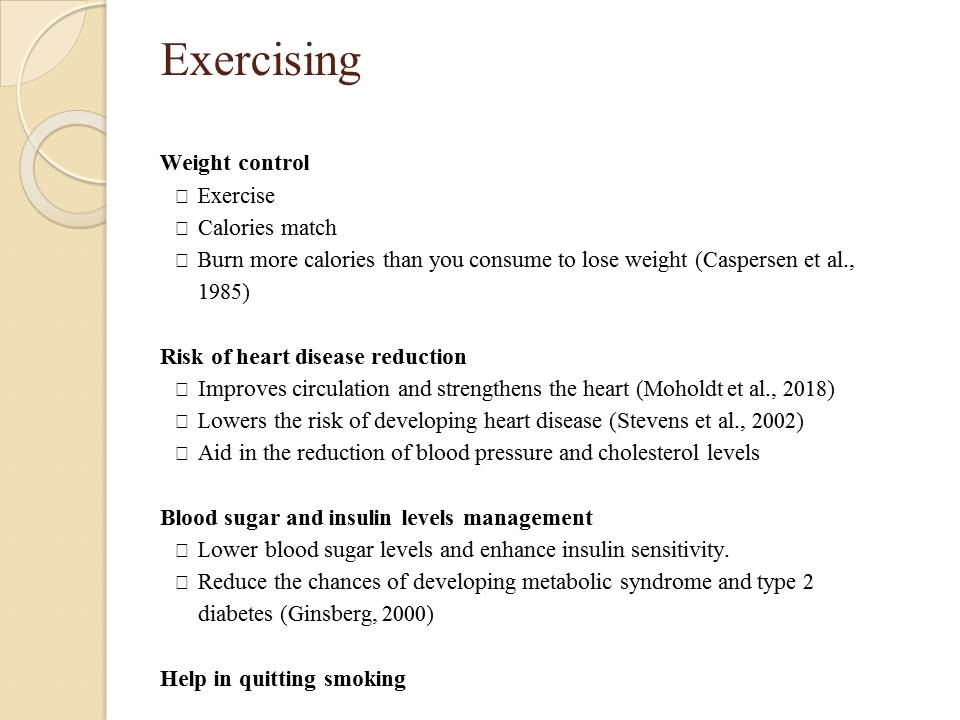
Effects on mental health and brain functioning
- Improve mental health and mood:
- Hormones production.
- Dealing with stress.
- As you become older, keep your thinking, learning, and decision-making abilities strong:
- Manufacturing proteins and other chemicals.
Improve mental health and mood
- During exercise, your body produces hormones that can boost your mood and help you feel more at peace.
- This can help you deal with stress and reduce your risks of depression.
As you become older, keep your thinking, learning, and decision-making abilities strong
- Exercise enables your body to manufacture proteins and other chemicals that aid in the formation and function of your brain.
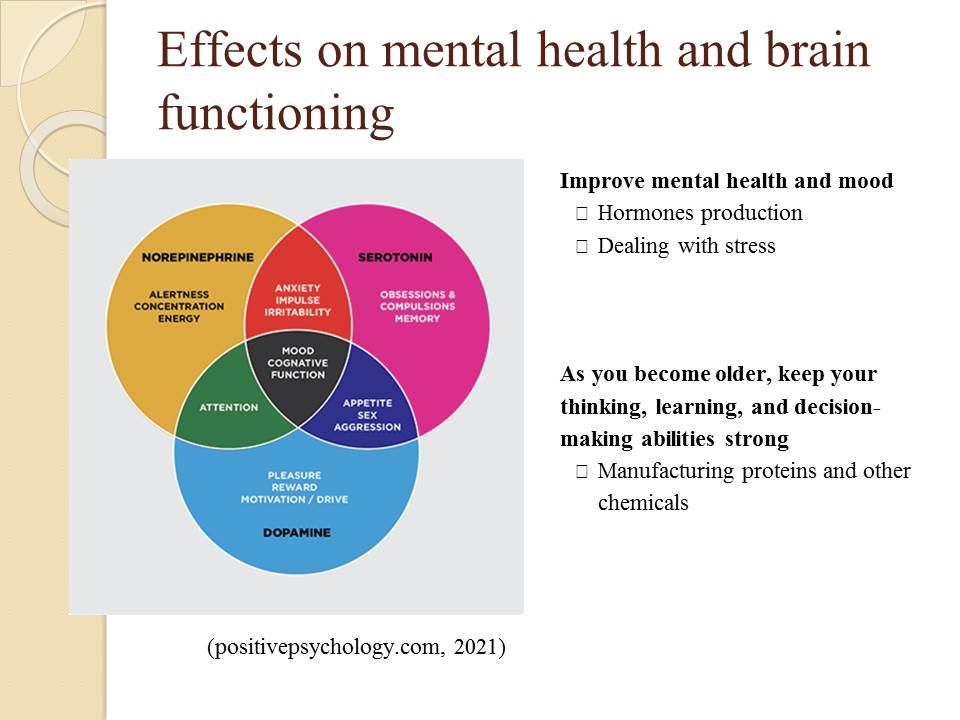
Benefits for body and sleep
- Strengthen bones and muscles:
- For children and teenagers.
- Halt the decrease of bone density.
- Increasing or maintaining muscle mass and strength.
- Reduce risk of falls:
- Muscle-strengthening and moderate-intensity aerobic activities.
Strengthen bones and muscles
- Regular exercise can aid in the development of strong bones in children and teenagers.
- It can also help to halt the aging-related decrease of bone density.
- Muscular-strengthening exercises can assist you in increasing or maintaining muscle mass and strength.
Reduce risk of falls
- Balance and muscle-strengthening activities, as well as moderate-intensity aerobic activity, have been demonstrated in trials to reduce the risk of falling in the elderly.
Improve sleep
Exercise can assist you in falling asleep faster and staying asleep for longer amounts of time.
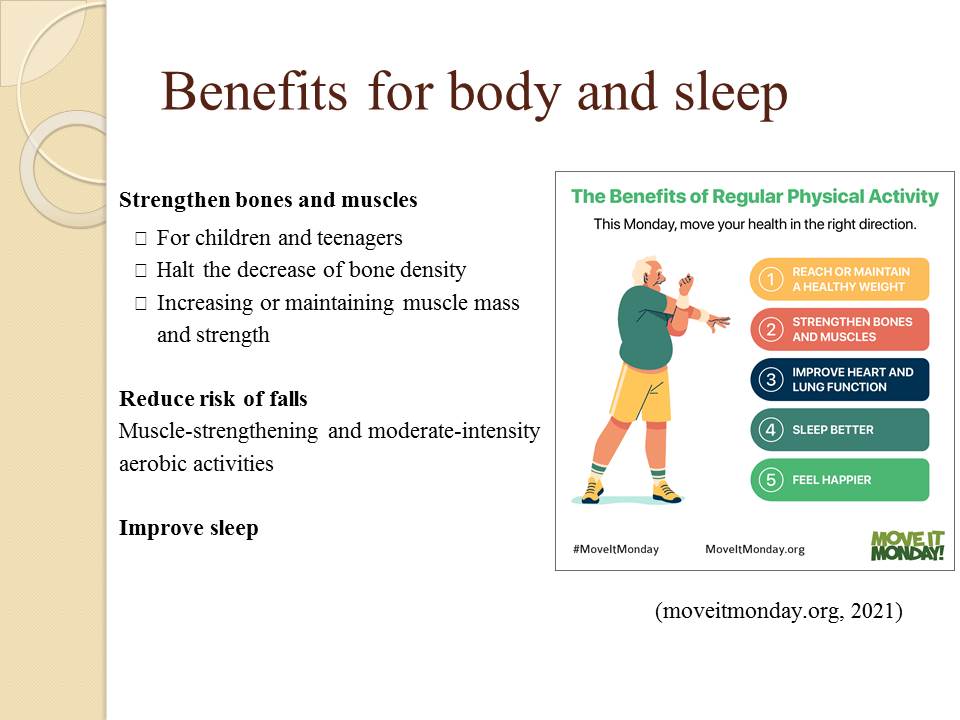
Other physical and mental health effects
- Improve sexual health:
- Less likely to develop erectile dysfunction (ED).
- Enhance sexual function in those who already have ED.
- Women’s sexual arousal may be increased.
- Increase chances of living longer (Lee et al., 1997).
- Reduce risk of some cancers.
- Get happier:
- Lessen symptoms of depression.
- Alleviate pain, improve mood, and reduce stress.
- Better look of skin:
- Exercise boosts blood flow to the skin.
- Keep your body temperature from increasing too high.
Improve sexual health
- Men who exercise on a regular basis may be less likely to develop erectile dysfunction (ED).
- Exercise may assist enhance sexual function in those who already have ED.
- Women’s sexual arousal may be increased by exercise.
Increase chances of living longer
- According to research, physical activity can reduce your risk of dying from the leading causes of death, such as heart disease and some cancers (Lee et al., 1997).
Reduce risk of some cancers
- Eg. colon cancer, breast cancer , uterine cancer, and lung cancer.
You might get happier
- Numerous studies show that various forms of exercise, ranging from walking to cycling, make people feel better and can even lessen symptoms of depression.
- Exercise helps the brain to produce chemicals such as serotonin, norepinephrine, endorphins, and dopamine, which alleviate pain, improve mood, and reduce stress.
Better look of skin
- Aerobic exercise boosts blood flow to the skin, delivering oxygen and nutrients that enhance skin health and even help in wound healing.
- Furthermore, the skin serves as a heat release point. According to Hackney, when you exercise, your muscles generate a lot of heat, which you must release into the environment to keep your body temperature from increasing too high.
- Heat moves from the muscle to the blood, which then transfers it to the skin, where it can escape into the atmosphere.
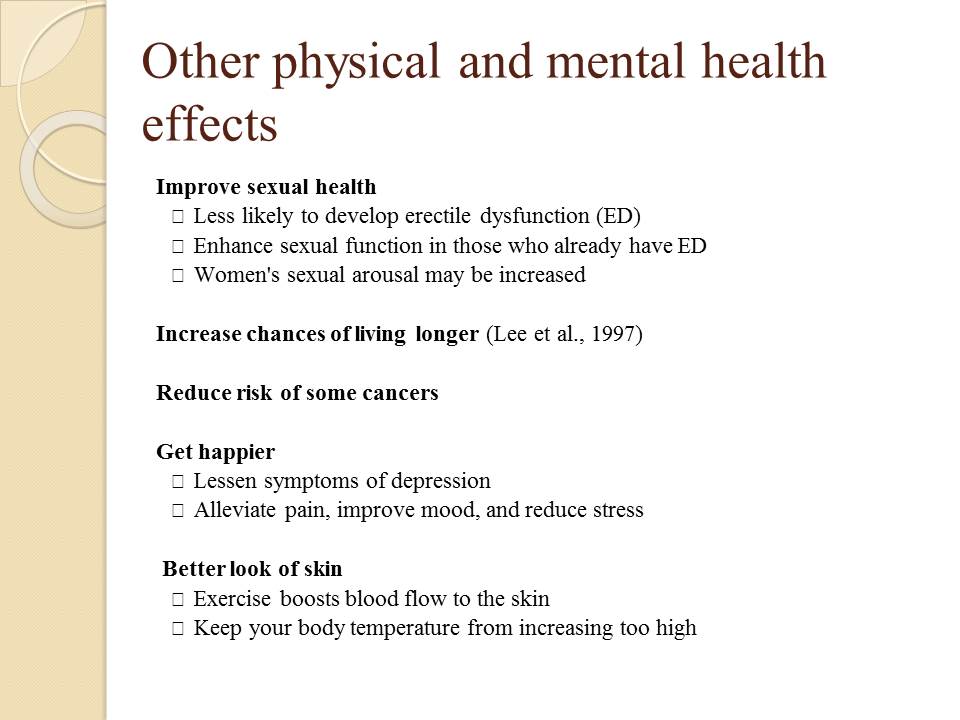
Fighting serious illnesses and self confidence
- Recover from a major illness (Florido et al., 2018).
- Improve self-confidence.
It can help you recover from a major illness
- Even really rigorous exercise, such as the interval sessions Gibala is researching, can be beneficial to persons with a variety of chronic diseases, ranging from Type 2 diabetes to heart failure.
- That is novel thinking, because for decades, persons with certain ailments were urged not to exercise. Scientists now know that considerably more individuals can and should exercise (Florido et al., 2018).
Improve self-confidence
- Don’t worry if you aren’t quite at Fonz-level self-assurance just yet; not all of us need to leap the shark to feel wonderful. Running on the treadmill may also make you feel like a million dollars.
- Physical exercise may promote self-esteem and improve positive self-image on the most fundamental level. Assurance Exercise may instantly boost a person’s self-esteem, regardless of weight, size, gender, or age.
Assurance Exercise is a means for you to remind yourself how lovely you are.
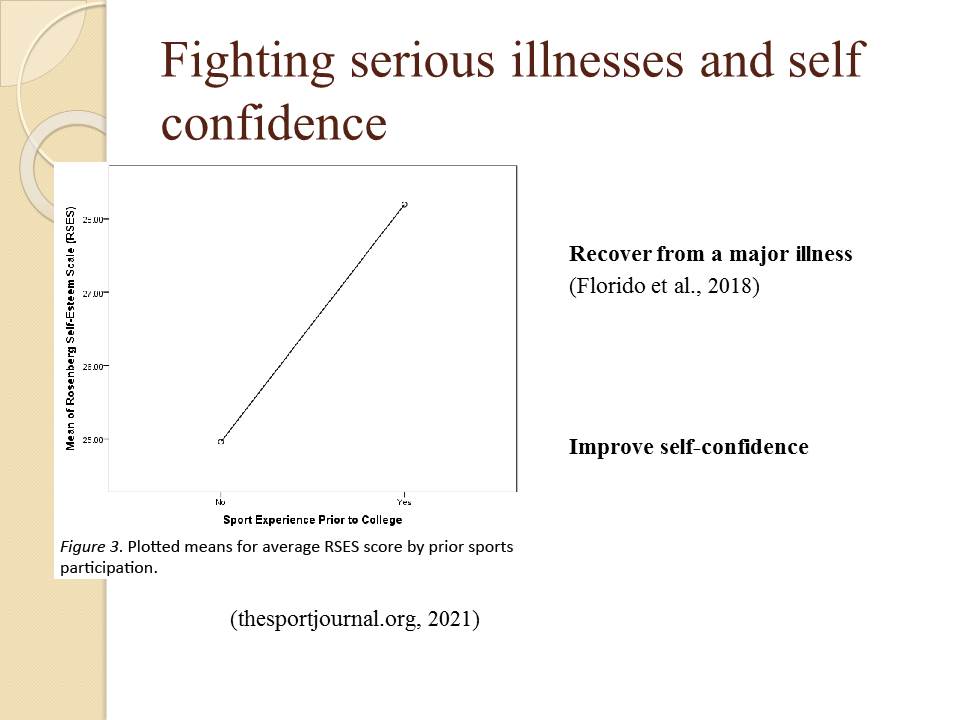
Fighting addictions
- Help manage addiction:
- Exercise may cause a significant surge of dopamine.
- This reward cycle in the brain can result in drug use disorder patterns.
- When attempting to stop smoking, physical exercise might help to distract smokers from their cravings.
- Excessive alcohol use disturbs several bodily systems.
- Difficulty falling asleep.
Help manage addiction
- In reaction to any sort of pleasure, the brain produces dopamine, the “reward molecule.” Yes, our beloved friend exercise may cause a significant surge of dopamine. However, so do narcotics and alcohol.
- This reward cycle in the brain can result in drug use disorder patterns. Exercise is available to persons who are recovering from addiction.
- When attempting to stop smoking, physical exercise might help to distract smokers from their cravings.Working out while on the wagon provides additional benefits.
- Excessive alcohol use disturbs several bodily systems, including circadian cycles.
- People who have an alcohol use disorder may have difficulty falling asleep if they do not drink.
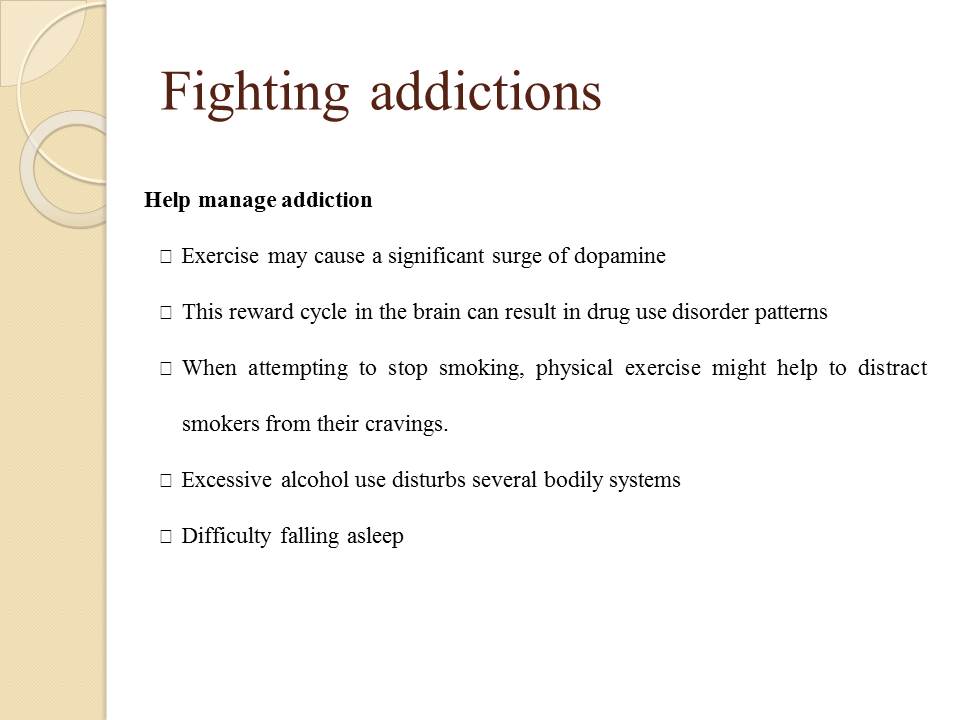
References
Stevens J, Cai J, Evenson KR, Thomas R. Fitness and fatness as predictors of mortality from all causes and from cardiovascular disease in men and women in the lipid research clinics study. Am J Epidemiol. (2002).
Florido R, Kwak L, Lazo M, Nambi V, Ahmed HM, Hegde SM, et al. Six-year changes in physical activity and the risk of incident heart failure: ARIC study. Circulation (2018).
Moholdt T, Lavie CJ, Nauman J. Sustained physical activity, not weight loss, associated with improved survival in coronary heart disease. J Am CollCardiol. (2018).
Caspersen CJ, Powell KE, Christenson GM. Physical activity, exercise, and physical fitness: definitions and distinctions for health-related research. Public Health Rep. (1985).
Lee IM, Paffenbarger RS Jr, Hennekens CH. Physical activity, physical fitness and longevity. Aging(1997).
Ginsberg HN. Insulin resistance and cardiovascular disease. J Clin Invest. (2000).
- Risk of heart disease reduction:
- Improves circulation and strengthens the heart (Moholdt et al., 2018).
- Lowers the risk of developing heart disease (Stevens et al., 2002).
- Aid in the reduction of blood pressure and cholesterol levels.